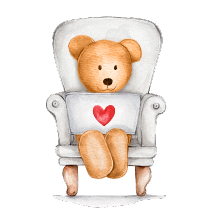
Your body and health
Doctor visits - Changes for you and your parents

As if parents couldn't find enough reasons to meddle in their teenagers' affairs - eating habits, bedtimes, outfits - you also have a heart that needs medical attention. It is very important that you acquire enough knowledge to be able to handle your heart responsibly yourself. The more you know, the better.
You probably already have a rough idea of what a normal heart looks like and how it works.
But what do you know about your own heart?
About eight out of every thousand people are born with a heart defect. Congenital heart defects come in varying degrees of severity and with a wide range of possible symptoms.
With a little research of your own, you can already gather an astonishing amount of information. But remember that every case is unique.
So don't be surprised if you meet people who have the same heart defect as you, but have completely different symptoms.
What should you know about your heart defect?
- What's the name of your heart defect?
- What exactly does the heart defect mean for you?
- How was it treated?
- What does my heart look like after the treatment?
- How can I tell if my condition is worsening?
- What should I do in this case?
- Why is it so important that I go for regular check-ups?
- How often do I have to go for a check-up?
- How do heart defects develop?
- Are heart defects hereditary?
- What do I need to know about my heart defect in my teenage years?
- Do I have to consider my heart defect when choosing a career?












You can participate in the decision making process
Even if it doesn't always seem that way to you:
You have the right to make a whole range of decisions about your life for yourself.
- For example, you have the right to say what you think about your visits to the doctor and the hospital and about your heart defect and its treatment.
- You should be asked for your opinion and you should be listened to before any decisions about your heart are made.



Further information:


Whether it's a small butterfly on your ankle or a skull on your arm, a gemstone in your navel or a ring in your nose - almost all of us have probably thought about getting a tattoo or piercing.
However, if you have a congenital heart defect, there are a few things you should be aware of - especially if you are taking anticoagulant medication or if you are at risk of endocarditis.
You're taking anticoagulants?
During tattooing, the ink is pricked under the skin with needles. This causes slight bleeding. If you take medication such as Aspirin, Marcumar, Cumadin or similar, your blood clotting will be inhibited. This makes it bleed much more. In this case the tattoo ink would be washed out by the bleeding. A tattoo is therefore out of the question.
Beware. Dubious tattoo studios might recommend you to stop taking your medicine for a certain period of time so that a tattoo is possible. However, discontinuing your medication can be life-threatening.
It's not worth it, is it?
Are you at risk for endocarditis?
If you are at risk of endocarditis, you should avoid piercings and be very careful with tattoos. During tattooing and piercing, bacteria can get into your bloodstream and thus also to your heart and endanger it. The least risky are piercings in the ear, because the ears are only weakly supplied with blood. However, piercings in the tongue or on mucous membranes, which are strongly supplied with blood, such as in the nose, are strongly advised against.
Although endocarditis is quite rare, you should take the risk seriously. If you are sure that you want to get pierced, you must first talk to your doctor, who can prescribe antibiotics to prevent endocarditis. Remember, however, that antibiotics may reduce the risk of endocarditis, but do not eliminate it completely.
Please pay attention to this
- Talk to your doctor if you are thinking about getting a tattoo or piercing. The risk of endocarditis depends on which heart defect you have.
- If you are under 18, you need your parents' consent for a tattoo or piercing.
- Also make sure that the tattoo studio is clean and works with sterile equipment.
- Choose a tattoo or piercing studio you trust. Talk to the people there about your heart defect and the risk of endocarditis.
- If you have recently been pierced or tattooed, be sure to see a doctor if you experience fever, headache, heavy sweating, joint pain or other symptoms.


Everybody knows: Taking drugs is not a very good idea! Because drugs are harmful to both the body and the soul and can cause serious health problems.
But if someone in your circle of friends takes drugs, you might sometimes think: "I can try it. It probably won't be that bad. Just this once..."
Risky for everyone
Drug use is risky for everyone. But if you have a congenital heart defect, drugs are even more dangerous. The heart defect has already put a strain on your heart. If you are taking drugs - including cigarettes and alcohol - the burden is even greater and can have devastating consequences for you.
Do not put everything at risk
Every time you take drugs, you take a risk. Alcohol, narcotics like cannabis and street drugs like GHB, affect your consciousness. Anxiety and paranoia are just two of the more common side effects. They also affect the heart. The problem is that you never know if, when, why, or how you will experience side effects.
Explain it to your friends
Don't let peer pressure intimidate you. Explain to your friends why drugs are particularly dangerous for you and your heart. A party may not be the best place to do this, but you'll find the right time to bring it up.
Just say no to drugs! Real friends will understand.
Is it worth it?
In some places and situations, drugs are relatively easy to get, such as in discos, nightclubs or parties. Taking a pill may seem completely safe in such moments - especially when lots of other people around you are doing the same.
But be careful, you can never be sure what's in the pills. Some drugs look harmless, but can have disastrous effects.
You may feel nauseous and dizzy or you may start to sweat a lot, get headaches, cramps... If you notice any of these signs, you should immediately call a doctor.
Let's be honest: Is it really worth it?
Better to be frank and honest
If you have taken drugs or are thinking about trying them, you would be better to talk to someone you trust and who knows about congenital heart defects - preferably your doctor - to help you. Talk openly about it.
Don't worry, he or she will certainly not think badly of you, but will help you and answer your questions.

From a medical point of view, alcohol consumption and nicotine are of course not advisable for adolescents, and certainly not for young people with heart defects.

The balancing act between "being cool" and "being sensible" is really difficult. When you go out with your friends, do your best to "slowly approach your boundaries". And remember:
Alcohol is not good for your heart.
Alcohol causes many problems.
Children and adolescents with heart disease are faced with two additional dangers:
- Alcohol causes acute cardiac dysrhythmia in the form of extrasystole and palpitations.
- Chronic alcohol consumption causes severe heart muscle insufficiency. The heart cells are damaged and degraded, resulting in a so-called cardiomyopathy (heart muscle disease).
This can be fatal over time.

Herzkinder sind noch viel mehr...
Viele unserer Ideen möchten verwirklicht werden! Dazu brauchen wir aber Deine Unterstützung, denn Veranstaltungen müssen geplant und organisiert werden und für viele Dinge müssen auch wir bezahlen.




